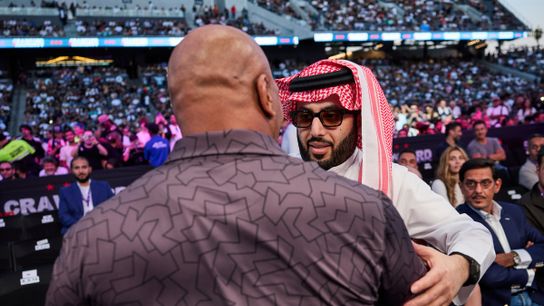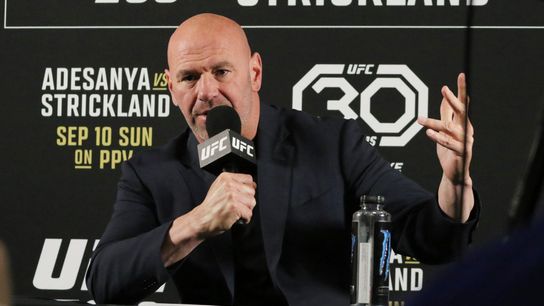(Editor's note: For complete transparency, please note that Kevin Iole has previously employed Nick Khan as his agent).
There was no news announced other than a partnership headed by Dana White and Turki Alalshikh designed to “reimagine the sport of boxing globally.”
No league name. No signed fighters. No broadcast deals. No timeline.
There wasn’t much other than the partnership itself and the points that academies to develop young fighters will be created; boxers will have access to the UFC’s Performance Institutes and TKO will handle broadcast production and in-arena experiences.
There are so many questions and next-to-no answers.
And yet, I’m left with the very real feeling for the first time in years — decades, maybe — that there is hope for boxing in the U.S. This could be something momentous.
The leadership, vision and financial might of White and Alalshikh make this attempt far different. For once, optimism is justified. This isn’t about one super fight lifting the sport temporarily. This is about real leaders, real money, and a real infrastructure.
If White and Alalshikh can’t do it, then who can? Their success in MMA and boxing gives them the credibility — and the responsibility — to attempt the surgery needed to fix this great but broken sport.
They are poised to help boxing end its decades long tailspin and regain a spot as a major player in the American sports hierarchy.
Boxing has struggled to gain traction for years. Rocky Marciano, the former heavyweight champion, spoke in 1969, on the day before his tragic death in a plane crash, of the issues plaguing the sport and why interest was dwindling.
Many of those issues still exist today.
White, the president and CEO of the UFC, grew up a boxing fan and could fairly be called a diehard. But when he bought into the UFC in 2001, he remade what was then a struggling mixed martial arts in his image.
White and partners Frank and Lorenzo Fertitta bought the UFC for $2 million in 2001. In 2016, the Fertittas sold it for more than $4 billion. It is now valued in excess of $12 billion.
The UFC skyrocketed under White’s visionary leadership as boxing’s fortunes plummeted. Saudi Arabia’s motherlode of money allowed Alalshikh to gain a foothold into the sport, but the opening was created by decades of neglect and the failure to follow simple business practices.
Until Alalshikh’s arrival spurred changes, boxing wasn’t run as a business. It was a revolving door of short-term cash grabs without any reinvestment in the sport or its infrastructure.
Fans never fell out of love with boxing; they’ve grown tired of the corruption, the chaos and the incompetence which have defined it for years.
There’s never been an attempt to unify the rules. There is no one in position of authority looking out for the best interests of the sport. There is no commissioner to run things; the rules are different from state to state and from country to country. It’s been every man for himself and that’s led to chaos and disorder.
Boxing has been infiltrated by con men, hucksters and those looking to make a quick buck off it for years. It’s never shied away from doing business with the underworld, whether it was Frankie Carbo and Blinky Palermo in the 1940s or Daniel Kinahan in this century.
There’s been such a low barrier to entry that it takes barely more than a home office and an internet connection to call oneself a promoter.
None of these “promoters” care about growing the sport and turning it into a real business that attracts big-name sponsors, adds fans, produces slick television broadcasts and a fun night out at a live event.
It’s a prodigious undertaking. Boxing is in far better shape in some parts of the world — The U.K., Japan, Eastern Europe — than it is in the U.S.
The Anthony Joshua-Daniel Dubois fight attracted 96,000 fans to Wembley Stadium in London last year. Next month, 65,000 are expected to watch Chris Eubank Jr. fight Connor Benn at Tottenham Hotspur Stadium in London.
Naoya Inoue’s fight with Luis Nery last year attracted over 56,000 to the Tokyo Dome and a $20+ million U.S. gate.
Those successes are a rarity in the U.S., but if the sport as a whole is elevated by keeping what works and eliminating the things that don’t, it can begin to make a move in a crowded and competitive entertainment marketplace in the U.S.

File
Turki Alalshikh, greeting Mike Tyson, continues his efforts to remake boxing with his partnership with TKO Group and Dana White.
The new group will face its challenges. Hopefully, they won’t try to gut the Muhammad Ali Act, as TKO CEO Ari Emanuel suggested. The law is weak and rarely enforced, but it exists to protect fighters. It should be strengthened, not dismantled.
The Ali Act is a U.S. law designed to protect boxers from disreputable business practices and create transparency.
White and Alalshikh are uniquely positioned to make the positive changes boxing needs. WWE president Nick Khan negotiated the deal for TKO with the Saudis. He’s a broadcast rights expert who understands boxing at a grassroots level.
The team is strong and the timing has never been better.
The burden, though, is on White and Alalshikh to prove they recognize the shortcomings and pitfalls facing boxing and are prepared to act.
They need to make quality fights up and down the cards, not just in the main event or even just the pay-per-view portion.
Fighters need to take real fights and not rack up wins by beating no-hopers in order to build a phony 25-0 record.
The sport needs to be promoted and marketed. Safety issues must be fixed. The quality of the broadcasts, which is routinely way below awful, must improve dramatically.
Rules need to be standardized and technology utilized to push it forward.
Boxing needs to be cool to kids again, who largely ignore it.
The challenge is massive and the doubters are many.
If it can be done, though, Dana White and Turki Alalshikh are the two who can do it. The question is: will they?

Imagn Images
UFC CEO Dana White has long been an avid boxing fan.

